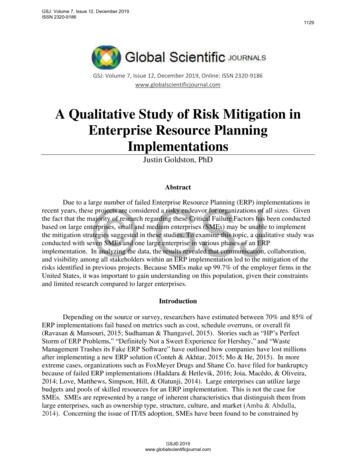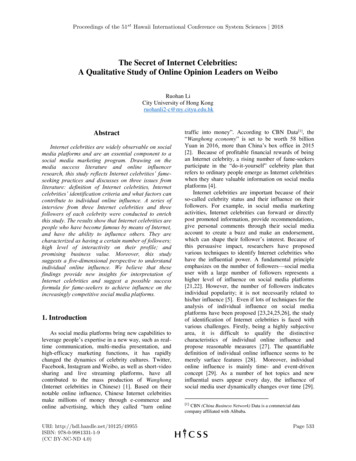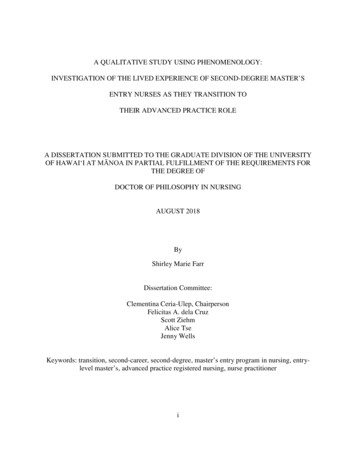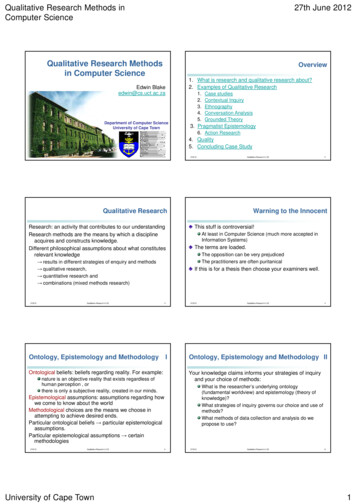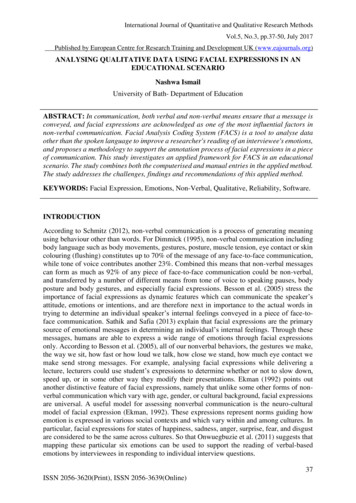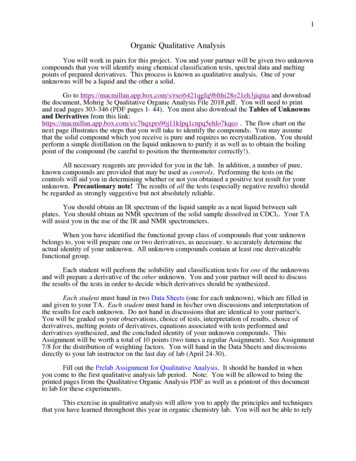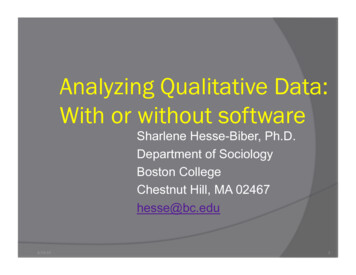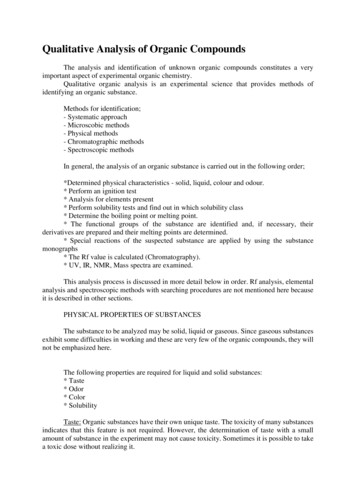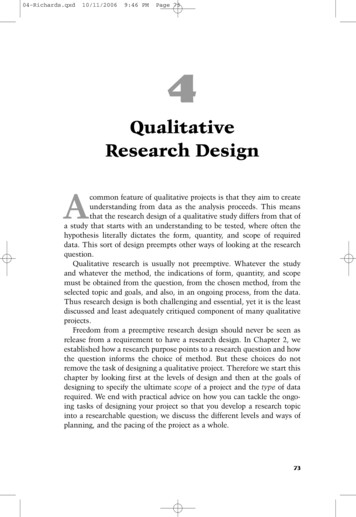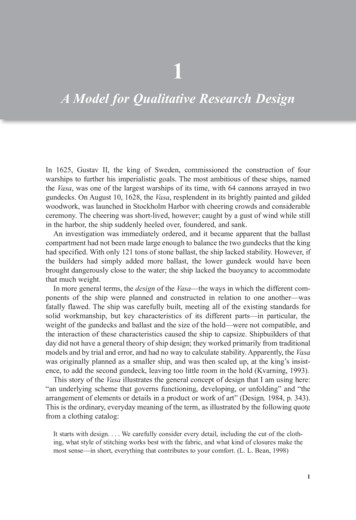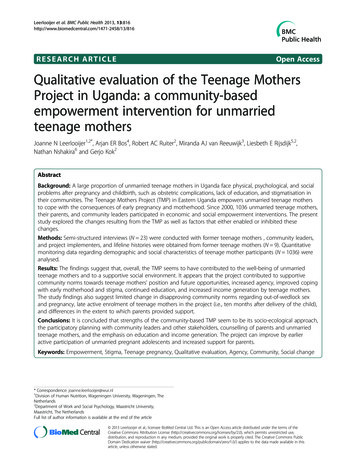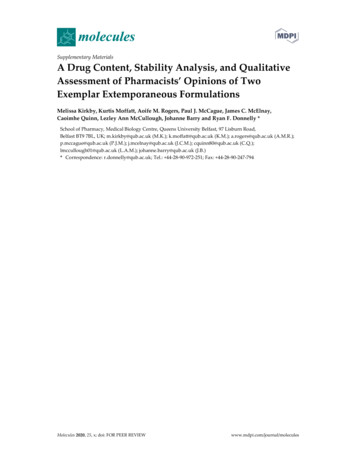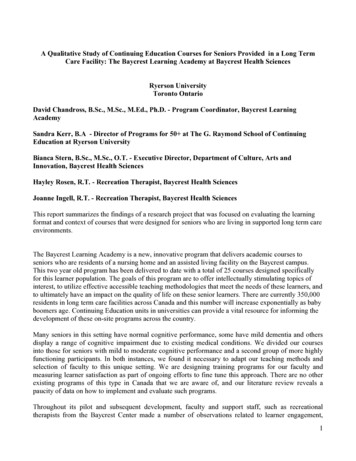
Transcription
A Qualitative Study of Continuing Education Courses for Seniors Provided in a Long TermCare Facility: The Baycrest Learning Academy at Baycrest Health SciencesRyerson UniversityToronto OntarioDavid Chandross, B.Sc., M.Sc., M.Ed., Ph.D. - Program Coordinator, Baycrest LearningAcademySandra Kerr, B.A - Director of Programs for 50 at The G. Raymond School of ContinuingEducation at Ryerson UniversityBianca Stern, B.Sc., M.Sc., O.T. - Executive Director, Department of Culture, Arts andInnovation, Baycrest Health SciencesHayley Rosen, R.T. - Recreation Therapist, Baycrest Health SciencesJoanne Ingell, R.T. - Recreation Therapist, Baycrest Health SciencesThis report summarizes the findings of a research project that was focused on evaluating the learningformat and context of courses that were designed for seniors who are living in supported long term careenvironments.The Baycrest Learning Academy is a new, innovative program that delivers academic courses toseniors who are residents of a nursing home and an assisted living facility on the Baycrest campus.This two year old program has been delivered to date with a total of 25 courses designed specificallyfor this learner population. The goals of this program are to offer intellectually stimulating topics ofinterest, to utilize effective accessible teaching methodologies that meet the needs of these learners, andto ultimately have an impact on the quality of life on these senior learners. There are currently 350,000residents in long term care facilities across Canada and this number will increase exponentially as babyboomers age. Continuing Education units in universities can provide a vital resource for informing thedevelopment of these on-site programs across the country.Many seniors in this setting have normal cognitive performance, some have mild dementia and othersdisplay a range of cognitive impairment due to existing medical conditions. We divided our coursesinto those for seniors with mild to moderate cognitive performance and a second group of more highlyfunctioning participants. In both instances, we found it necessary to adapt our teaching methods andselection of faculty to this unique setting. We are designing training programs for our faculty andmeasuring learner satisfaction as part of ongoing efforts to fine tune this approach. There are no otherexisting programs of this type in Canada that we are aware of, and our literature review reveals apaucity of data on how to implement and evaluate such programs.Throughout its pilot and subsequent development, faculty and support staff, such as recreationaltherapists from the Baycrest Center made a number of observations related to learner engagement,1
preparation of course materials, use of multimedia, measuring learner satisfaction and retention of corematerial and related questions. We chose to interview a substantial pool of learners, the coreadministrative team who provide the facilities and services for delivery, and teaching staff who havebeen working with the learners.The Learning Academy at BaycrestThe Baycrest Learning Academy was co-pioneered by Sandra Kerr, Director of 50 programs for theRaymond Chang School of Ryerson University and Bianca Stern, Executive Director of TheDepartment of Culture, Arts and Innovation at Baycrest Health Sciences. Baycrest is a health careservice continuum and residential facility located on Toronto, Ontario and is a leader in the field ofaging and brain health. Baycrest has a long-standing research and innovation pedigree, and their currentCenter for Learning, Research and Innovation is one of only 3 operating in Canada, funded by thefederal government. Baycrest is affiliated with the University of Toronto and is also home to the worldrenowned Rotman Research Institute. The Baycrest Center had many features which made themattractive for such a partnership. The Chang School, at Ryerson University under Sandra’s direction,has provided seniors in the community with academic continuing education (CE) courses for over 20years. There was a mutual vision to bring academic courses from the community 50 program into theBaycrest long term care facility setting.The Baycrest Learning Academy focused on delivering courses in the nursing home and assisted livingapartment. The learners, who are primarily in their late 80s to mid 90's range in cognitive ability fromcognitively intact to mild-moderate cognitive impairment. The assisted living apartment had relativelyhigher functioning learners but due to the fact that residents aged in place, there did exist an overlap oflearners at similar functional levels. In both instances, we found it necessary to adapt our teachingmethods and selection of faculty. Our literature review revealed a paucity of data on how to implementand evaluate such programs.This study has allowed us to gather relevant data in a more systemic process although we have beenlearning iteratively and reflecting on what is working and what is not. Faculty working collaborativelywith on-site Baycrest staff have synthesized observations related to learner engagement, preparation ofcourse materials, use of multi media, learner satisfaction and retention of core material. As part of thisstudy, we chose to interview senior learners, core administrative team who provide the facilities andservices for delivery and teaching staff who have been working with the learners.In May of 2013, the first group of four courses were introduced and course feedback was elicited in theform of focus groups and end of course surveys. The response to the first four courses was positive.Class sizes ranged from 15-30 students, most of whom requested further education in their surveyresponses. In October 2014, an additional four courses were added. The program operates on a 3semester system per year schedule. In February 2014, a new set of four courses was implemented and acoordinator was hired to develop a long term strategy for the program, given the consistent highattendance and positive feedback from participants. Currently we run 4 courses per term, with 3 terms ayear, and a continuous Psychology/Philosophy seminar series once a week. We also provide a summercourse and are looking at introducing a 4th full semester per year.2
The courses we offer are distinctly different than “how to” courses. Courses in Tai Chi, yoga, bakingand fitness, for example, are routinely offered across senior’s care facilities in Canada. We areproviding academic courses, which feature critical analysis, discussion, abstract thinking andcomprehension. The Baycrest Learning Academy provides a genuine university experience, by takingcourses to the learner.The outcomes of this research project include;1. An analysis of how to adapt teaching methods to this target population, and2. An analysis of physical facility requirements and implementation requirements for similar programs,including use of multimedia, recruitment of students, retention of students and integration with supportfunctions germane to long term care.This paper is focused on the adaptation of teaching techniques for this learner population. To date,course enrollment has been robust.The value of such courses lies in three domains. The first is related to the quality of life in long termcare settings for seniors. The “life of the mind” should be, in our opinion, preserved well into one’slater years. Recent publications by Rebok et al, (Jan 2014) show that a cohort of 2,832 seniors in theregular community showed increases in quality of life related to life decisions, hygiene and well beingafter 10 years of participation in seniors education offerings. We have reason to believe, on the basis ofour observations, that seniors continue to benefit in these domains in a long term care setting.Often, assumptions are made about the learning capabilities of older adults, especially those residing inassisted living or long term care. Our experiences (and the literature) have shown us that theseindividuals continue to have preserved strengths and abilities that can be enriched with the cognitivestimulation of educational courses.Further, Rebok showed a 2014 study published by the American Geriatric Society that even 10 briefsessions of mental training provided increases in both reasoning and speed of processing, and that foursession booster training at 11 and at 35 months after initial training produced “durable and additionalimprovements” in both tasks. The third value of such courses is in improving cognitive performance inour groups, by rehearsal, engagement, abstract learning and group learning activities. There are no dataon these outcomes and we wish to measure outcomes in the future to see if we can improve cognitiveperformance or delay the loss of performance through academic course offerings. The first steps of anysuch long term research program is identification of teaching methodologies and physicalenvironmental constraints or opportunities as they relate to these course offerings. It is our hope thatthis research project will provide the first initial step toward eventual measurement of cognitivevariables such as improvement of memory, reasoning and abstract thinking in learners.3
Examples of Courses Offered 2013-2015Gods and Goddesses of FashionGreat Jewish PianistsJazz Music HistoryHigh Adventure Travel and Wilderness ExplorationArt HistoryGreat Discoveries and the Great Women of ScienceAestheticsArcheologyLiterature ReviewThis is an entirely new field of inquiry, that of the delivery and measurement of learning in long termcare settings. Each of our learners has a distinct combination of cognitive and physiologicalcharacteristics and each group of learners brings its own set of challenges. As such, we discovered thatour literature review was largely inferential in nature, we found ourselves needing to extrapolate on thelearning experience from existing papers on senior’s education in the community (see AdditionalReferences Consulted During Research Project Design).In an attempt to locate rare papers on this subject, we contacted the Seniors Health InformationNetwork, who conducted a specialized review on our behalf, they found a total of eight relevant papers,only two of which described learning in this setting, and none of these papers was related to ongoingprogram implementation. The results of this requested review are listed below. (Literature Search:Teaching LTC Residents: Prepared by the Seniors Health Information Network). LTC refers to longterm care.Over the past year, publications in this field have increased substantially, these data were not availablewhen the study began and some of the key references are provided below. In particular, the work on theincidence of dementia, non-dementia changes in cognition and learning and adapted instruction.Cognitive function decline is observed in many sub-categories of seniors. Yu and Boyle et al, 2015,showed that during an 18 year study of older adults, 44% showed no decline, 30% had moderatedecline, 13% showed severe decline and 8% showed demonstrable fluctuations in function over time.(American Psychological Association. (2015). What Is the Profile of Cognitive Aging?Neuropsychology) and (Yu, L., Boyle, P., Segawa, E., Leurgans, S., Schneider, J. A., Wilson, R. S.,and Bennett, D. A. (2014). Residual decline in cognition after adjustment for common neuropathologicconditions. Neuropsychology. Advance online publication.). In addition, changes in lifestyle, incomeand other social factors influence cognition, effects on learning and higher function are not always dueto dementia. (American Psychological Association. (2014). Experiences at Every Stage of LifeInfluence Mental Function in Advanced Age. Neuropsychology.). Judge and Camp showed, usingMontessori-adapted teaching methods, that motor and cognitive skill development through teaching issuperior to verbal enabling of thinking skills. (Sukel, K. (2015). American Psychological Association.Fostering Independence, 46(3), 42.)Music and art instruction in this group appears to be particularly promising. Both art and music have4
been shown to have measurable effects in increasing the latency to decline in early dementias due toAlzheimers (Morgan, Jules. "Hooked on Music: therapy for Alzheimer's disease?" The Lancet ) and see(Neurology 14.1 (2015): 37). Musical memory is preserved differently than other forms of memory andthere is a strong rationale to engage in music courses based on its apparent ability to reduce the decline ofverbal and other skills in dementia. (Jacobsen, Jorn-Henrik, Johannes Stelzer, Thomas Fritz, Gael Chetelat,Renaud La Joie, and Robert Turner. "Brain." Why Musical Memory Can Be Preserved in AdvancedAlzheimer's Disease. June 3, 2015.). Autobiographic recall is enhanced in music therapy programs indementia (El Haj, Mohamad, et al. "Self-defining memories during exposure to music in Alzheimer'sdisease." International Psychogeriatrics (2015): 1-12.) and thus the effects of courses in music and relatedarts do appear to show this “triggering effect” we have observed in our program.When music courses are provided, they contribute to autobiographic recall particularly when sung, ratherthan listened to, defining a participatory role in learning about the arts as a possible therapeutic intervention(Simmons-Stern, Nicholas R., et al. "Music-based memory enhancement in Alzheimer's Disease: Promiseand limitations." Neuropsychologia 50.14 (2012): 3295-3303.) The study of art work has been also shownto produce several main effects related to cognition and social connnectedess (Mason D. Flatt, PhD, AmyLiptak, BSN, Rn, Mary Ann Oakley, MA, Jessica Gogan, MA, Tresa Varner, MFA, and Jennifer H.Lingler, PhD, CRNP. “American Journal of Alzheimer’s Disease & Other Dementia.” SubjectiveExperiences of an Art Museum Engagement Activity for Persons With Early-Stage Alzheimer’s Disease andTheir Family Caregivers. (2015).)With respect to the measurement of robust cognitive outcomes of long term learning in seniors, a fieldwell documented and directly useful in our study, the work of George Rebok et al, January 2014 wasthe most helpful and current source. This reference is listed ahead under its own category. This paperwas fortuitously published in January 2014, as we were designing the study. To say that data in thisfield is just emerging is appropriate.Inferential logic, or forward reasoning, is a weak basis for drawing any form of conclusion.Extrapolation of data on improvements in learning from community-based senior’s programs, forexample, is not helpful, in that our learners vary in cognitive ability within and across groups. There isconsiderable data showing that senior’s education is of benefit over the long term, but these data are notof great value in measuring our current learner experience.MethodologyOur research protocol used Guba and Lincoln’s grounded theory approach combined with participantobservation. This consists of collection of data from multiple sources and organization of that data intocategories which are suggested during data collection. These categories are then compiled and groupedinto related themes. These themes are interconnected and lead to an analysis to present a narrative ofthe learner and instructor experience. Our analysis consists of describing how senior’s learningproceeds in the long term care setting, from the viewpoint of the learners, instructors and administrativestaff who are directly involved with program delivery. The administrative staff in this case, refers torecreational therapists (RT)s, who provide course recruitment, student tracking, booking rooms andequipment.5
The goals were to;a. isolate variables of program delivery and learning needs/challenges which are different than those ofconventional classroom education for seniorsb. describe how those variables inter-relate, for example, how hearing or visual disabilities affect thetype, pacing and content of instructionc. develop a model for addressing these variables where they negatively impact learningThe study subjects were selected from three groups.The first group, the learner cohort (LC) consisted of interview subjects who had completed courses inthe program. They were interviewed using a short, 5 question exploratory survey probing thefollowing themes.a. learner satisfaction with the programb. learner wishes for other academic contentc. learner requests to instructors to improve course quality or to compensate for a disabilityd. learner expectations coming into the programe. retention of core principles taught in the courseThe second group, the instructional cohort (IC), was provided with a 5 question survey exploring thefollowing themes.a. instructor driven changes in course content to adapt material to this groupb. instructor driven changes in content delivery for the course to this groupc. their impression of how much students understood and retained the course materiald. their recommendations regarding pacing of contente. their recommendations for the use of technology to enhance learning in this groupThe third group, the facilities cohort (FC), was interviewed with a 4 question survey exploring thefollowing themes.a. budgetary planning for introduction academic programs for seniors in long term careb. space and facility requirements for the program, including technology such as internet access orother needsc. marketing and recruitment of learners for the program, both internally and externallyd. retaining student records, performance of needs assessments and working with continuing educationunits at universities or colleges.In summary, data was collected on the student experience, the faculty experience and the administrativestaff experience, in order to form an understanding of the challenges and opportunities for introductionof new programs of this type in the future. As themes emerged from cross-referencing data fromdiverse interview subjects we were able to construct a descriptive analysis of how seniors education inthe community is extended into a long term setting. From these data we were able to determine whatelements of these course offerings need to modified to be effective for this target population.6
Our methodology shifted during the study as we discovered that instructor observation of learnerbehavior, reports from recreation therapy staff who worked with the program and investigatordiscussions with learners also provided rich data. The original framing of our questions was focused onLearner expectations, satisfaction and desire for more program offerings. In all cases, learnersatisfaction was positive and indicated contentment with the course goals and delivery. This type ofapproach, where one approaches the data set from a variety of perspectives, borrows from journalisticinquiry using similar epistemologic principles and cultural anthropology, through observationalanalysis. In short, we found that reducing all interview data to a specific theme resulted in data loss, asmany of the nuances of the learning experience (such as varying degrees of engagement across diverse“level of care” populations) were not specifically explored during learner interview.The critical epistemological methodology we employed with exploring the data set in addition to theoriginal thematic analysis were derived from modern knowledge theory a. observation, b. coherenceand c. consensus. As the study proceeded, both the recreation therapy staff and the investigator, alongwith the faculty cohort, contributed observations, which, when they recurred, were identified asobservational data and added to our construction of narrative. Therefore, given that our interviewpopulation varied with respect to the fecundity of interview data (with a mix of normal cognition, earlydementia and moderate dementia), it was necessary to record observations across all 3 study cohorts toproduce a more comprehensive and helpful picture of the teaching, learning
attractive for such a partnership. The Chang School, at Ryerson University under Sandra’s direction, has provided seniors in the community with academic continuing education (CE) courses for over 20 years. There was a mutual vision to bring academic courses from the community 50 p
